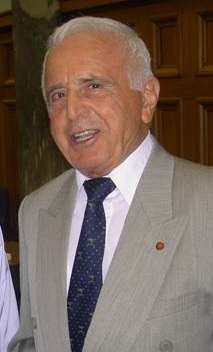Drury points out the obvious in their NZ Herald report. For those who fled Islamic sharia based laws, bringing these teaching to nz, the violent Quran and hadith based sharia, splits our once-unified local Muslims. It was Drury who published the press release by FIANZ celebrating their takeover of the NZ meat industry in the 1970’s. This from NZ Herald about how Home country doctrine splits once-unified local Muslims:

Most New Zealanders have never heard of the retired Muslim community leader Mazhar Krasniqi.
Indeed, most New Zealand Muslims have never heard of him.
This is in spite of the fact that this Kosovar-Albanian was awarded a QSM in 2002 for his decades of unreported community service.
Last year the New Delhi-based Institute of Objective Studies ranked this former Panmure resident as one of the top 100 Muslims of the 20th Century – alongside the American boxer Muhammad Ali, Ayatullah Khomeini, the King of Saudi Arabia and other international Islamic luminaries.
In April 1979 the indefatigable Krasniqi managed to draw together the Muslim organisations of three different regions (Auckland, Wellington and Christchurch), uniting them in the first national Islamic body in this country – the Federation of Islamic Associations of New Zealand (FIANZ).
He achieved this through determination, characteristic hard work, a solid commitment to Islam and Muslim unity, and above all by his personal integrity.
Those ignorant of history are doomed to relive it.
Most of the problems facing Islamic institutions in New Zealand reflect the cultural inability or intellectual unwillingness of incumbent mosque leaders, frequently new migrants, to consider the experiences of their predecessors: their hearts, minds, rationale and prejudices are still firmly rooted in their home countries.
More than one North Island critic has stated that some Canterbury Muslims think they’re still living in Africa or the Middle East. That neatly encapsulates the problem, although South Island Muslims frequently retort that Indian migrants are monopolising the North Island mosques.
(The South Auckland mosque in Otahuhu, for example, notoriously gives sermons exclusively in Urdu – a language only spoken by people from the Indian subcontinent and totally meaningless to the countless Arabs, Albanians, Malays and Somalis resident there).
One Arab immigrant, who has been here nearly 10 years, recently said to me indignantly outside the Canterbury Islamic Centre: “The language of the mosque is Arabic!”
It isn’t. The lingua franca of mosques up and down New Zealand is English. The language of the Koran is Arabic (classical – not vernacular).
This is an English speaking country and all the immigrants and refugees speak English as their common language, not Arabic or Urdu.
However, by stating this idea my friend has betrayed the sentiments felt by many immigrants: the mosque is the last vestige of their homelands and they want it to remain that way, even if that leads to tension or conflict with other ethnic or sectarian groups within the New Zealand Muslim community.
These tensions have inevitably led to a proliferation of smaller Islamic centres in Auckland where more than 20 different groups currently operate outside the established, older Muslim institutions and indeed, outside the national Islamic Federation.
What has happened in 25 years since Baba (uncle) Mazhar brought all the Muslims together? Why are things falling apart now?
The most significant contribution stems from the massive and poorly planned influx of immigrants and refugees from Africa and the Middle East in the 1990s. Nobody in the local Muslim community ever anticipated or planned this.
The size of the national Islamic community leapt from approximately 2000 souls in 1980, to over 23,000 at the 2001 census.
The pioneering Muslim families who established Islam in this country have been effectively overwhelmed: swept out of office by the superior numbers of the new faces, or entrenching themselves and encouraging newcomers to set up their own Islamic prayer arrangements.
There was also a substantial change in composition. In the 1970s most Muslims in New Zealand were either shopkeepers and small businessmen, or university students: educated professionals with a good grasp of life in New Zealand.
They were mostly from societies with long traditions of interaction with white Anglo-Saxon culture and customs: Indians, Fiji Indians or Pakistanis. Or like Mazhar Krasniqi, European.
Now there is a substantial bloc, often Arab or African, with considerably poorer education than their predecessors, with vastly different language skills and cultures to those this country has traditionally absorbed.
This has exacerbated community differences along ethnic, linguistic or cultural lines inside mosques from Christchurch to Auckland.
Unaccustomed to mosques being run by laymen and unfamiliar with the process of reviewing the records of society meeting minutes for example, new immigrants and refugees raise questions and issues that have already been addressed and resolved.
Very quickly they use their disproportionately larger numbers to vote in their own leaders.
Consequently a fair number of mosques in New Zealand are currently being administered or dominated by people and groups who have arrived in this country within the last 10 years, some substantially less.
They may lack any administrative experience since mosques in their home countries are managed by government departments.
This lack of continuity affects every aspect of the burgeoning Muslim community here and it is a genuine shame that contemporary mosque leaders nationwide do not take the time to study the contribution of role models like Krasniqi who took nearly 30 years to unite the New Zealand Muslims but did so peacefully and successfully.
Perhaps what is needed is more Islam and less pusillanimity.
* Abdullah Drury is a former social secretary of the Muslim Association of Canterbury, with four years of work experience with the Federation of Islamic Associations of New Zealand.
